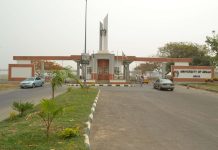Many Nigerian students are facing tough times in the United Kingdom after the naira equivalent of their tuition fees increased by over 60 per cent following the recent move by the Central Bank of Nigeria to unify the nation’s foreign exchange rates.
About two weeks after President Bola Tinubu promised to unify the nation’s multiple exchange rates, the apex bank decided to float the naira at the Investors and Exporters’ Window of the foreign exchange market. Since then, the naira has fallen from N471/dollar to N750/dollar and N589.4/pound to N957.2/pound.
This has led to about 60 per cent increase in tuition fees for students in the UK.
This rise in exchange rate has put more pressure on many Nigerians that are schooling in the UK and beyond.
The UK is one of the destinations of choice for many Nigerians as 128,770 Nigerian students enrolled in universities in the United Kingdom between 2015 and 2022 according to data from the Higher Education Statistics Agency of the UK.
According to the CBN, study-related foreign exchange outflow to the UK rose to $2.5bn in 2022. Nigerian students and their dependants in the United Kingdom contribute about £1.9bn annually to the UK economy, according to an analysis by SBM Intelligence.
Many of these students may now struggle to pay the balance of their tuition due to the sharp decline in the value of the naira.
UK universities are currently on break.
Students lament hike
A Nigerian student resident in Manchester, Adejoro Deborah, who sounded stressed told The PUNCH, “This policy is affecting those of us here and even intending students. My sibling has had to forfeit her admission because of this policy.
“Many students have fallen victim to online scammers just because they want to buy pounds, a friend of mine, for example, was a victim of third-party purchase as the banks at home are not dependable.”
Another Nigerian student studying in Leeds explained that the major challenge was that many kept their tuition fees in their naira account at the former rate.
The student said, “Now they have to start looking for more money because the rate has gone up. If the official rate is not different from street rate, so what’s the essence of waiting for several weeks for your bank when you can just get it from third-party platform. It has only put more pressure on the students to look for more money.”
The student added, “If you put N5m in your account in March when the rate was around N560/£, that means it will pay around £9k tuition fee, but by July, the N5m will only be able to pay around £5k since the rate is now around 1k/£, so that’s where the real problem is. You need to start looking for an additional £4k. That’s the challenges many students are facing.”
Another Nigerian, who is currently studying at Liverpool John Moores University, has become stranded after the school withdrew his access to the school portal.
His access to the university’s portal was withdrawn by the school following his failure to pay his tuition. The Nigerian (name withheld) could not raise the required 4,800 pounds to complete his tuition.
Narrating his ordeal to The PUNCH, he said, “The school has withdrawn my access to its platform. As a result, I can’t check the results of my last exam. Everything is done via the platform. I cannot also access my official email given by the school. I can’t attend both online and in-person classes again. It is very frustrating, I am completely shut out.”
The depressed student, who is allowed to work for 20 hours a week as a student, said he could not get a better job because prospective employers were demanding proof that he is allowed to work as a student.
He added, “In fairness to the school, I was given several deadlines which I missed. I could not pay because I was unable to raise enough funds to buy foreign exchange. The exchange rate is very high.”
Another student (name withheld) of the school, said he was on the verge of losing his studentship before he managed to borrow money from friends in Nigeria to pay his tuition.
He shared a copy of a letter that had been addressed to him giving him a final deadline to pay the outstanding tuition.
The letter read in part, “According to our records there is an outstanding balance of £4800 on your university tuition fee account. LJMU has advised you of this situation via emails to both your LJMU and personal email addresses.
“Despite this correspondence, the debt remains outstanding and accordingly, we are now arranging for you to be withdrawn as a student of the University. If this happens, UK Visas and Immigration will be informed that you are no longer a student at LJMU.”
The letter was sent by the Head of Registry Services of the school.
A student, studying IT Project Management at Teesside University, lamented to The PUNCH that many Nigerian students are still in shock.
She said, “Some people are not totally stable because they used to convert their naira to pounds for school fees payment.”
She explained that while she did not benefit from the official rate initially, she still has to pay more now. She said “When I got in initially, I converted at the rate of N920-935 thereabout. But after the CBN reforms, it has been a nightmare. The highest I did a while ago was N990. But today, it is about N1008, if not more.”
Another Nigerian student (name withheld), who is studying at Strathclyde University, explained that the new exchange rate might cause him to drop out of school.
He said, “This new reality has called for a review of the whole plan entirely. Everything has to reset at the end of the year.
“My year is ending in October/November but I now have to review everything. I am running a Ph.D. programme and the cost is 20,000 pounds a year. When we were using Form A and the official rate was about N600, it was about N11m.”
He noted that his budget when he started was between N33m –N35m for the entire programme. He stated, “Now, I will be looking at N20m for the second year and N40m in total for my remaining two years.
“This is causing me to rethink my plans, because I can’t spend that type of money on this. N40m is a lot, especially on those at home that are sponsoring this, it doesn’t sound reasonable. This will impact how I will continue with my course.”
Speaking on the matter, a student currently studying in the UK, who simply identified herself as Shalewa said, “When I started schooling in London in 2017, pounds was about N300 or less. I am still in school and now I had to pay N1,000 for one pound. 19,500 pounds to naira means that my mum will be coughing out millions that she should be using for retirement.”
An international multimedia journalist and student based in the UK, Michael Orodare, noted that the suffering of many Nigerian students is an open secret.
He said while many people had tried to use Form A to pay their tuition fee balance, earlier, banks had delayed with excuses, including issues around tax clearance.
He said, “A lot of students are finding it difficult to pay their tuition. What many Nigerian students here are now trying to do is to use the naira in their account to try and buy pounds which is now more than N1000. This is now more expensive and making fee payment very difficult for Nigerian students.”
Intending students worry
The increase in the cost of forex is also affecting many Nigerians intending to study in the UK.
For many of them, Proof of Funds is the most problematic part of their application process now.
According to an education consultant, Oyebode Omolewa, Proof of Funds is a student’s tuition balance plus living expenses. She stated that it is a crucial requirement for students planning to go to the UK as it proves to the UK government that a student has the capacity to take care of themselves while studying.
She noted that the rates are now dependent on when student submit their visa applications. She explained that when the official rate was around N560 – N600, students’ proof of funds was lower.
Omolewa said, “Proof of funds is the student’s tuition balance plus living expenses. For example, if a student’s tuition is about 15,000 pounds, and they pay 5,000 pounds to the university, their proof of funds will be the 10,000 pounds balance plus living expenses.
“If the school is located outside of London, the cost of living is 9,207 pounds, if it is in London, it is 12,006 pounds. Let’s say we have a 10,000 pounds balance, if the school is outside London which is 9,207 pounds, when you add the two together, you will have 19,207 pounds multiplied by the exchange rate on the day you applied for a visa.
“If it was N1000 on the day it was 19,207 pounds multiplied by N1,000 before it used to be about N580 multiplied by 19,207 pounds.”
Omolewa further explained that PoF has been affected a lot, especially for students trying to go with their family members.
She noted that PoFs have almost doubled. She said, “PoF has almost doubled. This is likely to affect the number of people applying for study Visas now because if you were planning N15 million initially and now you need about N6 million extra if you don’t have it, you will just have to wait until you get it.”
Another student, who is planning to leave by August, said the PoFs had increased considerably with many intending students struggling to meet up.
He said, “When you calculate PoF now, the least you will get is about N1,100. It has really affected it, and it is not a good one. If you wanted to do a PoF of 19,000 pounds, before now you would need N16 million in your account. But now, you would have nothing less than N24 million for a 19,000 pounds PoF.”
Another intending UK-bound student, who only gave her name as Titi, stated that when she started her visa processing, PoF was pegged at N600/pound. According to her, she would have fallen victim to the new exchange rate if not that she applied less than a week before the change.
She noted that her PoF which was N9.8 million is now over N16 million. She told The PUNCH, “I am still good on my PoF, it was still less than N9.8 million. The Friday before the 12th of June, someone asked me to apply for my visa.
“Thank God for countries like the UK where your PoF will be determined based on the exchange rate of the day you apply. That was my saving grace. I applied on that Friday, and by the following week, exchange rate had gone up.
“My PoF was a little above N9.5 million. By the following week, it hit N16 million. I was going to be judged according to the exchange rate on the day of my application, but the thing is if I had applied a little later than I did, my PoF would have risen to over N16 million. I am just an average Nigerian, I don’t have one N6 million, N8 million somewhere. I would have needed about N17 million if I was late.”
According to her, she would have deferred her admission if she had applied after the exchange rate went up.
A Nigerian student in the UK, who didn’t want her name in print, explained to The PUNCH that her brother is currently in the process of relocating to the UK through the study route.
She noted that her family is currently looking for an extra N7 million to N8 million because of the new exchange rate.
She said, “We are on the PoF matter for my brother, and we just have to get more money. He has not yet applied as we are just getting his CAS, this new exchange rate is biting.
“Under the old exchange rate, we needed about N6 million to N8 million, but now we need N14 million to N15 million. As of this morning, a pound is N1000+. When it was my turn, all my calculation was at N600, for my brother it is at N1000. There is a N400 difference that is choking everyone. It is financially more demanding and constraining.”
Form A challenge
Form A, which is an application form designed by the CBN to pay for service transactions such as school fees, medical fees, and more, allows customers to purchase funds at the CBN or interbank rate to make payments for these services.
Lamenting on how frustrating the Form A is, an LLM student at the University of Birmingham, who did not want her name disclosed told The PUNCH, “I opened my Form A in April and at the time, I was to pay N1.8m and of course, I was waiting for processing days.
“Now, with the new policy, I need N3.1m. So, even though I have the N1.8m, the money that I require now is twice the amount. So, I can’t have the Form A processed.”
A senior officer of a popular commercial bank who spoke to our correspondent under the condition of anonymity noted that despite the floating of the naira which has highly affected the exchange rate, the bank still receives huge requests of FX [Form A].
The officer said, “We still have a long queue and what we do is that we give priorities to our corporate customers. It was expected that the new policy would actually make things better, but it has not. The rates are higher, and people still come in. Some of the Form A requests were even brought in before the new policy was implemented. “
A travel consultant, Samuel Agboola, affirmed to The PUNCH, “Many people who left to study in the UK still don’t have their fees processed by Nigerian banks. The banks deducted the money from their accounts but have yet to do the conversion and pay their schools. Now the exchange rate has changed, and they have to pay more. That is the reality.”
78,679 Nigerians
Meanwhile, no fewer than 78,679 international students from Nigeria are currently studying in the UK, United States of America, Canada, and Ukraine, an analysis by The PUNCH has shown. The figure excludes Nigerians who study in these countries but did not process their admissions from Nigeria.
According to the Higher Education Statistics Agency of the United Kingdom, as of December 2022, there were about 44,195 international students from Nigeria in UK institutions with average tuition fees between £11,000 – £32,000.
Findings by our correspondent also revealed that Nigerians are most concentrated in schools like the University of Hertfordshire, University of Salford, University of Leeds, University of Portsmouth, University of Birmingham, and the University of Nottingham remained some of the universities in the UK.
Nigerian parents plead with FG
The National President of the National Parents Teachers Association, Haruna Danjuma in an interview with The PUNCH pleaded with the Federal Government to intervene in the FX crisis.
Danjuma said, “If you ask for my honest opinion, I will say the Federal Government should help all those involved because when you look at it, it is not their fault.
“Also, one of the reasons people even go abroad in the first place is because of the situation of things in our institutions. We need the government to work together with parents and academics to find a way in which we can solve the problems in the education sector.”
Commenting on next steps, he stated, “I will raise the issue with my executives, and we will issue an official position. You know as the national president I can’t just take any position without other members. I will raise the matter.”
While lamenting the effect of the new forex policy, a parent, Akinjagunla Paul, though resident in the United Kingdom begged the President to help out students who applied for Form As before the new FX regime was implemented.
He said, “It is important for the President to be informed that he needs to urgently grant concessions to Nigerian students abroad who initiated their Form A requests for payment of school fees before the new FX regime was introduced, rates have increased from about N550 to N1,000.”
Punch


























